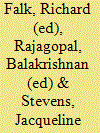|
|
|
Sort Order |
|
|
|
Items / Page
|
|
|
|
|
|
|
| Srl | Item |
| 1 |
ID:
141312


|
|
|
|
|
| Summary/Abstract |
Since 2012, the Deportation Research Clinic, part of the Buffett Institute for Global Studies at Northwestern University, has been pursuing research on government misconduct under the rubric of what Jacqueline Stevens calls “forensic intelligence.” The Clinic uses law and publicity, including scholarship, to create new realities, which in turn produce new facts and knowledge. Stevens draws on scholarship by S.M. Amadae, Noam Chomsky, Philip Green, Chalmers Johnson, Kenneth Osgood, Ido Oren, Michael Rogin, and Frances Saunders to explain the relation of “forensic intelligence” to the “national intelligence” paradigm now organizing mainstream political science research. The article concludes by describing how U.S. government and economic elites distort research and teaching priorities, and provides examples from Northwestern University.
|
|
|
|
|
|
|
|
|
|
|
|
|
|
|
|
| 2 |
ID:
083333


|
|
|
|
|
| Publication |
London, Routledge, 2008.
|
| Description |
x, 275p.
|
| Standard Number |
9780415439787
|
|
|
|
|
|
|
|
|
|
|
|
Copies: C:1/I:0,R:0,Q:0
Circulation
| Accession# | Call# | Current Location | Status | Policy | Location |
| 053844 | 341/FAL 053844 | Main | On Shelf | General | |
|
|
|
|
| 3 |
ID:
074636


|
|
|
|
|
| Publication |
2006.
|
| Summary/Abstract |
If analysts want to understand the forces that give rise to the sovereign units that make up the 'us' and 'them' comprising the affinities and enmities of enduring inter-state inequality and systemically violent conflict, then we must move beyond the Weberian understanding of the state as an institution that has a monopoly of the legitimate use of violence and towards a deeper understanding of the rules that hold together the state as a membership organisation. This means several things but, for the purposes of this article, imagining the cessation of war and a truly global politics (committed to enabling conditions for the creative recreation of the planet and its inhabitants, regardless of where or to whom they were born) means understanding how all states create the form of the 'other' liable to yield death as an active or passive consequence of their kinship rules.
|
|
|
|
|
|
|
|
|
|
|
|
|
|
|
|
|
|
|
|
|